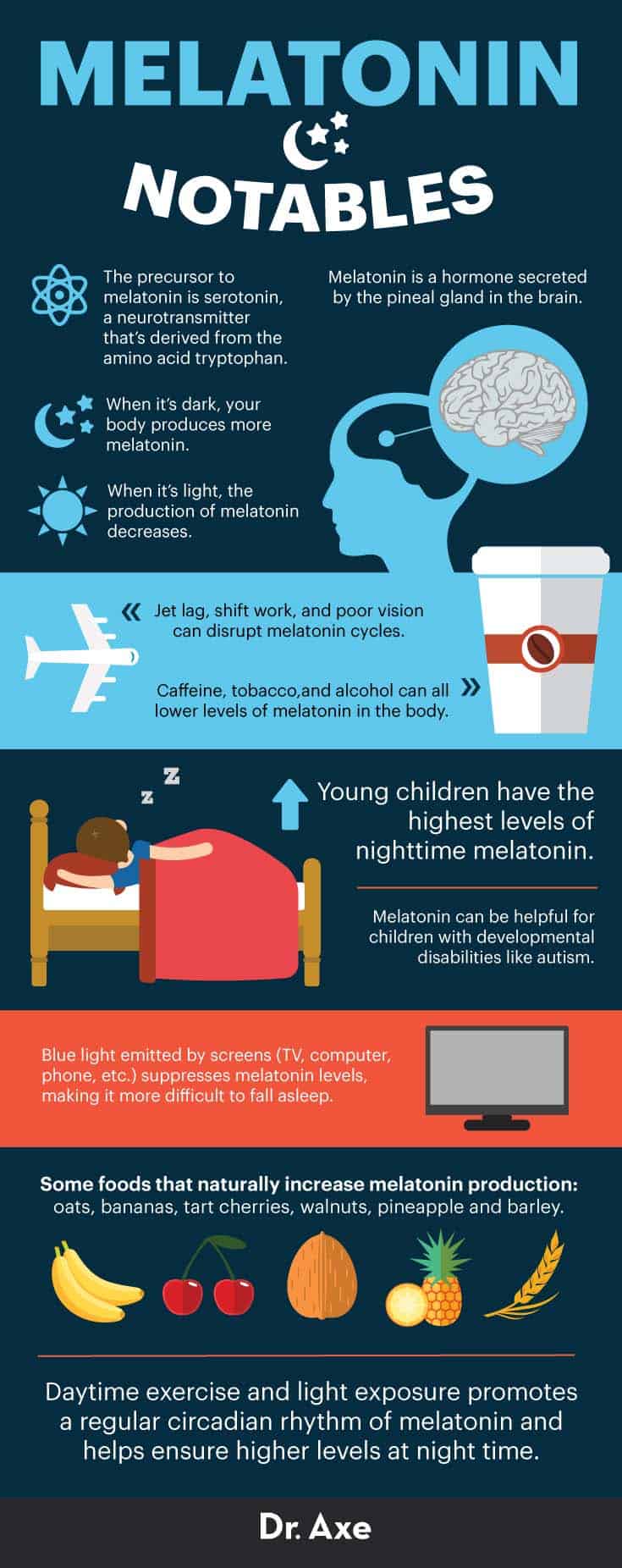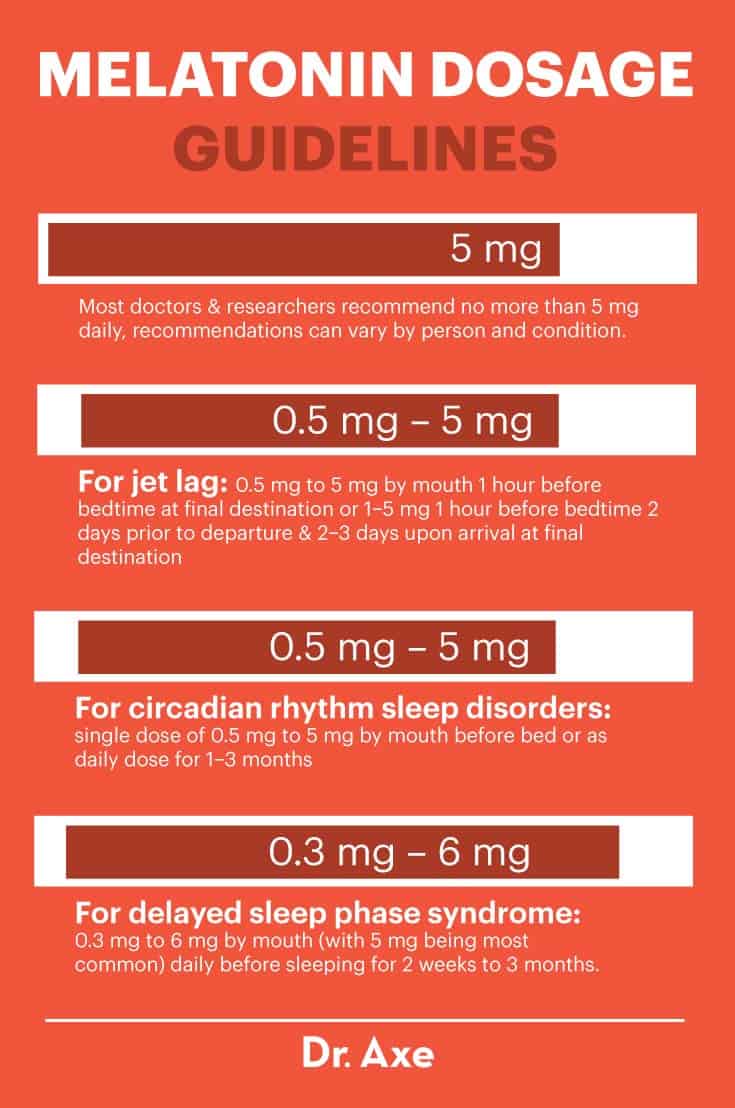
According to a 2016 Centers for Disease Control and Prevention study, one out of three American adults does not get enough sleep on a regular basis. For millions of people, melatonin might be the answer to preventing another terrible night’s sleep.
We know that avoiding sleep deprivation is highly important for maintaining overall health, in part because it helps ward off both acute and chronic health problems. Not only can melatonin be used to help treat sleep problems like insomnia and jet lag, but research also suggests that at it may benefit cancer patients, specifically those diagnosed with breast or prostate cancer.
While melatonin is naturally produced by our bodies, caffeine, alcohol and tobacco use can all lower levels in the body. So can working the night shift or having poor vision, since both disrupt the amount of natural light reaching the eyes.
For some people, supplementing can help get their inherent rhythms get back on track. Below we’ll talk more about which conditions melatonin can help manage, how much is safe to take and the amount that is recommended for particular health concerns, including sleep disorders.
What Is Melatonin?
Melatonin (N-acetyl-5-methoxytryptamine) is a hormone secreted by the pineal gland in the brain, which is located just above the “middle brain” and is about the size of a pea.
This hormone is responsible for setting your “sleep-wake cycle” and for maintaining your body’s circadian rhythm, so long as you take the proper melatonin dosage. Its synthesis and release are stimulated by darkness and suppressed by light.
Your circadian rhythm is the fancier term for your own person internal clock, which runs on a 24-hour schedule, just like the day. This internal clock plays a critical role in when you fall asleep and wake up, so regulating it is critical for dealing with sleep disorders.
When it’s dark, your body produces more melatonin, but when it’s light, the production of melatonin goes down. This is why people who are blind or work night hours can have problems with maintaining normal levels.
For anyone, a lack of light exposure during the day, or exposure to bright lights in the evening, can disrupt the body’s normal melatonin cycles.
Melatonin is also crucial to female reproductive health as it plays a role in controlling the timing and release of female reproductive hormones. It helps decide when a woman starts to menstruate, the frequency and length of menstrual cycles, as well as when a woman stops menstruating completely (menopause).
Researchers believe that melatonin decreases as we age and that young children have the highest levels (particularly at night, which is why they typically sleep longer and more deeply than adults). If this is true, then it can help explain why older people don’t tend to sleep as well as they did when they were younger.
How It Works
When you’re exposed to light, it stimulates a nerve pathway from the retina in the eye to an area in the brain called the hypothalamus. This is where the suprachiasmatic nucleus (SCN) is located, and the SCN initiates the turning on of the pineal gland.
Once the SCN turns on the pineal gland, it starts making melatonin, which is then released into your bloodstream.
The precursor to melatonin is serotonin, a neurotransmitter that’s derived from the amino acid tryptophan. A naturally occurring chemical called acetylserotonin acts as the intermediary.
Serotonin produces acetylserotonin, which is then converted into melatonin.
Besides its role as a precursor in the synthesis of melatonin, acetylserotonin is also known to have antidepressant, anti-aging and cognitive-enhancing benefits.
Many of the health benefits that are thought to be due to increasing serotonin levels may actually come from serotonin’s ability to make melatonin production possible.
In most adults, the body starts producing melatonin around 9 p.m. Levels then increase sharply, and you begin to feel more sleepy.
If your body is running as it should, your level remains elevated while you sleep, for a total of approximately 12 hours. It then drops, and by around 9 a.m., the level is back to a barely detectable level, where it remains during the day.
Benefits/Uses
What is melatonin used for when taken as a supplement? By far, its best known usage is as a natural sleep aid.
But did you know that it also serves many other functions too, such as supporting your immune system, cardiovascular function and reproductive health?
Recent studies indicate that some of the many uses/functions of melatonin include:
- Fighting free radicals and having antioxidant actions
- Facilitating bone formation and protection
- Assisting in reproduction
- Supporting detoxification
- Regulating body mass
- Providing gastrointestinal protection
- Protecting against psychiatric disorders, mood disorders and cardiovascular diseases
- and more
Below is more about the top melatonin benefits and uses:
1. Natural Sleep Aid
Research suggests that supplementing with melatonin may help people with disrupted circadian rhythms, such as people who work the night shift and people who have jet lag. Supplementation may also help individuals sleep better who have chronically low levels, like people with schizophrenia, who have poor sleep quality.
One randomized, double-blind trial found that two milligrams of melatonin prolonged release (PR) given one to two hours before bedtime was associated with significant improvements compared to a placebo in sleep quality and length, morning alertness, and health-related quality of life. The study also found that whether the melatonin dosage (two milligrams PR) was short- or long-term, there was no dependence, tolerance, rebound insomnia or withdrawal symptoms.
Studies have uncovered evidence that melatonin is effective in advancing sleep-wake rhythms in people with delayed sleep phase disorder. Delayed sleep phases are experienced by those who struggle with waking up later in the morning than is considered normal/socially acceptable.
Taking melatonin can help people with this sleep problem fall asleep a bit sooner, although it can take some trial and error to determine the best timing and dose.
Recent research indicates that to be most effective in treating delayed sleep, it’s best to take small doses four to eight hours before desired sleep time. In some cases, it may make only a small difference in terms of time to fall asleep, such as by helping people drift off about 10 minutes earlier.
2. Potentially Helps Treat Cancer
Several studies suggest that low melatonin levels may be associated with risk for certain types of cancers. A 2017 study published in Oncotarget states, “Melatonin could be an excellent candidate for the prevention and treatment of several cancers, such as breast cancer, prostate cancer, gastric cancer and colorectal cancer.”
To determine this hormone’s effectiveness at stopping tumor growth, in 2014 one group of researchers evaluated its actions on the growth of breast tumors in vitro (using human cancer cells) and in vivo (using mice). The researchers found that melatonin may inhibit tumor growth and cell production, as well as block the formation of new blood vessels in estrogen receptor-negative breast cancer models.
Another study looked at women who were taking the chemotherapy drug tamoxifen for breast cancer but not seeing any improvement. With the addition of melatonin to their treatment regimens, researchers found that tumors “modestly” shrank in more than 28 percent of the women.
Studies also show that men with prostate cancer have lower melatonin levels than men without the disease.
One study published in Oncology Reports aimed to verify whether melatonin might modulate the growth of androgen-dependent prostate cancer cells. The results demonstrated that it can significantly inhibit the proliferation of prostate cancer cells.
Combined, these studies and others show melatonin’s great promise as a potential natural treatment for cancer. However, if you have cancer, you should always speak with your doctor before taking any supplements/over-the-counter treatments.
3. Decreases Negative Menopause Symptoms
Melatonin supplements have been shown to improve sleep problems experienced during menopause. In a study of perimenopausal and menopausal women ages 42 to 62, within six months of daily supplementation, most of the women reported a general improvement of mood and a significant mitigation of depression.
The findings of this study appear to demonstrate that supplementation among perimenopausal and menopausal women can lead to recovery of pituitary and thyroid functions that is more in the direction of a youthful pattern of regulation. This is great news because it shows that this hormone can help to decrease common negative perimenopause symptoms and menopause symptoms, like sleeping problems.
4. Heart Disease Helper
Multiple studies suggest that melatonin has heart-protective properties. Specifically, research shows that when it comes to cardiovascular health, it has certain anti-inflammatory and antioxidant effects.
It also may help lower blood pressure and cholesterol. Its cardioprotective properties seem to come from its “direct free radical scavenger activity,” according to studies.

5. Fibromyalgia and Chronic Pain Relief
Fibromyalgia symptoms include long-term and widespread pain in muscles and connective tissues, without any specific cause.
A randomized, placebo-controlled study of 101 patients with fibromyalgia syndrome evaluated melatonin’s effectiveness at reducing symptoms. The study found that patients experienced a significant reduction in their fibromyalgia symptoms when they supplemented either alone or in conjunction with the antidepressant fluoxetine (Prozac).
The group who took only melatonin was given a daily dosage of five milligrams while the other group took three milligrams and 2o milligrams of the antidepressant.
Other studies suggest that melatonin might be able to help with other chronic painful conditions, like migraine headaches. A 2019 systematic review found that in a number of studies, melatonin reduced headache frequency (attack frequency or number of headache days), duration and intensity significantly.
Headache frequency decreased by 33 percent to 83 percent, averaging 51 percent. The reduction of headache duration was 32 percent to 56 percent (average 46 percent), and headache intensity was 33 percent to 78 percent (average 53 percent) among adults involved in the studies that were reviewed.
6. Immune System Strengthener
Research shows that melatonin has strong antioxidant effects and may help strengthen the immune system. A 2013 scientific review called melatonin an “immune buffer” because it appears to act as a stimulant in an immunosuppressive condition — plus it also behaves as an anti-inflammatory compound when there’s an intensified immune response, like in the case of acute inflammation.
7. Eases Jet Lag
Supplementing with melatonin may be able to help “reset” your sleep and wake cycle when you experience dreaded jet lag.
A scientific review of a large number of trials and studies all involving melatonin and treatment of jet lag found evidence that melatonin is “remarkably effective in preventing or reducing jet-lag, and occasional short-term use appears to be safe.” The researchers found that in nine out of 10 trials, when it was taken close to the target bedtime at the destination (10 p.m. to 12 a.m.), there was a decrease in jet lag from crossing five or more time zones.
The researchers also observed that daily doses between 0.5 and five milligrams worked similarly well, but subjects did fall asleep faster and sleep better after taking five milligrams compared to 0.5 milligrams.
When a dosage above five milligrams was given, it did not produce any better results. Another key conclusion is that the timing is key because if it’s taken too early then it can delay adaptation to the new time zone.
The incidence of other side effects from melatonin dosage was found to be low.
8. Better Outcomes for Autism in Children
Research has shown that melatonin can help children with developmental issues like autism.
A 2011 scientific review published in Developmental Medicine and Child Neurology evaluated 35 studies that had melatonin-related findings involving autism spectrum disorders, including autistic disorder, Asperger’s syndrome, Rett syndrome and other common developmental disorders. After reviewing the numerous studies, researchers concluded that melatonin supplementation in autism spectrum disorders is linked to better sleep parameters, improved daytime behavior and minimal side effects.
9. May Ease Tinnitus
Research suggests that melatonin may serve as a natural tinnitus treatment.
Tinnitus is a condition that causes noise or ringing in the ears. The antioxidant properties of melatonin may contribute to its ability to alleviate tinnitus.
READ RELATED: The Herb that Supports the Brain, Gut & Heart
Researchers at the Ohio State University Eye and Ear Institute conducted a study involving 61 participants. After taking three milligrams of melatonin nightly for 30 days, the participants experienced a significantly greater decrease in tinnitus symptoms.
Supplementation also helped improve the quality of sleep in patients with chronic tinnitus.
10. Can Help Relieve Bladder Dysfunction
Melatonin receptors are found in the bladder and the prostate. It works to prevent elevations in levels of malondialdehyde, which is a marker for oxidative stress.
Through the reduction of oxidative stress, melatonin helps combat age-induced bladder dysfunction. It also limits bladder contractions and induces relaxation, helping relieve issues like overactive bladder.
An article review published in Current Urology found that, although the exact mechanisms of action are not yet fully understood, there is a strong body of evidence suggesting that a melatonin imbalance can have a detrimental effect on bladder dysfunction.
A 2012 study suggests that nightly production of melatonin helps improve sleep and reduce habitual nightly urination. Supplementation also seems to increase bladder capacity and decrease urine volume due to its effects on the central nervous system.
11. Helps Relieve Stress
Melatonin levels change when you experience stress. Stress decreases concentrations at night and increases production during the day, which is due to the increase of cortisol, the stress hormone.
Melatonin can help to relieve stress by controlling the level of stimulation experienced by the body.
If you feel anxious, melatonin helps ease anxiety symptoms like daytime fatigue, drowsiness, insomnia and restlessness. It also promotes a calm mood and supports brain function.
12. Supports Production of Human Growth Hormone
Supplementing with melatonin has been shown in some studies to help increase human growth hormone levels in healthy men under 40, which can have benefits such as supporting growth of muscle mass and a healthy metabolism.
There’s also evidence indicating that at low doses it can increase oxytocin and vasopressin levels, which may impact moods, blood pressure levels and other functions.
13. Helps Prevent Mood Disturbances
As pointed out by a 2017 study, “Circadian rhythm alterations resulting in disturbed sleep and disturbed melatonin secretion are flagship features of depression.” Mood disturbances, including seasonal depression, seem to be impacted by exposure to light and sleep cycles.
There’s evidence suggesting that melatonin may help decrease depression symptoms by regulating serotonergic neurotransmission.
14. May Help Protect the Brain
Although there’s more to learn about the topic, there’s emerging evidence showing that melatonin may help protect against neurodegenerative diseases, such as Alzheimer’s disease. It seems to improve neuronal survival and may be able to help protect the cholinergic system against oxidative stress and inflammation.
Recent clinical trials indicate that supplementation can improve sleep and slow down the progression of cognitive impairment in Alzheimer’s patients.
Melatonin Dosage
You can easily find melatonin at your nearest health store or online in a number of forms:
- capsule
- tablet
- liquid
- lozenge (that dissolves under the tongue)
- topical cream
Melatonin pills are a very common selection, especially the sublingual lozenges designed for rapid absorption.
Another option is topical melatonin, which is said to support skin quality as well as sleep. Researchers have found that it penetrates into the outer layer of skin, reinforcing the skin’s capacity for repair, renewal and revitalization during the night.
Are you wondering, how much melatonin should I take?
Most doctors and researchers recommend no more than five milligrams per day, but recommendations vary by person and condition.
It is possible to purchase 10-milligram melatonin supplements, which are often sold as “extra strength” or “maximum strength.” But it’s a good idea to check with your doctor before taking any product containing more than five milligrams.
There’s currently no standard recommended melatonin dosage because people react differently to taking it. For people who are very sensitive, lower doses appear to work better.
For sleep troubles, you should know that the right dose should help you sleep well with no daytime tiredness or irritability, so if you’re always tired, it can be a great option to reverse that trend.
It’s always a good idea to start off with a very low dose of melatonin and see how you do. You can follow supplement directions on the label or consult an expert if you’re unsure about how much to take.
How long does it take for melatonin to work? How long before bed should I take melatonin?
To encourage a better night’s sleep, taking it one to two hours before bed is a common recommendation.
You can help this supplement work even better by naturally getting yourself ready to sleep, such as by:
- keeping the lights dim
- staying off of your computer, smartphone or tablet
- staying more than six feet away from any screens, such as your TV
- doing something relaxing, such as showering or reading, as part of your “bedtime routine”
- eating foods that can help naturally increase production, such as oats, bananas, tart cherries, walnuts, pineapple and barley
- and by getting exposure to daylight during the morning and afternoon
Melatonin Dosage for Treating Problems in Adults:
How much melatonin should you take to sleep? Here are some melatonin dosage recommendations for different health concerns, including insomnia:
- For insomnia or occasional sleeplessness: According to the National Sleep Foundation, “Between two tenths of a milligram and five milligrams taken 60 minutes before bedtime is a typical dose for adults, while children should take a smaller dose. Too much melatonin can disrupt your sleep cycle, so start with the smallest dose of two tenths of a milligram and increase it as needed.” Staying between one and three milligrams seems to be a healthy range for most adults.
- For jet lag: 0.5 to five milligrams of melatonin by mouth one hour before bedtime at final destination has been used in several studies. Another approach that has been used is one to five milligrams one hour before bedtime for two days prior to departure, and then for two to three days upon arrival at final destination.
- For circadian rhythm sleep disorders (in people with and without vision problems): A single dose of 0.5 to five milligrams by mouth before bed or as a daily dose for one to three months.
- For delayed sleep phase syndrome: 0.3 to six milligrams by mouth (with five milligrams being most common) daily several hours before going to bed, taken for two weeks to three months.
Melatonin Dosage for Children:
Always consult your pediatrician before giving melatonin to a child.
If your child has a neurodevelopmental disorder that causes sleep trouble, your doctor may prescribe melatonin. It’s also used to treat symptoms of ADHD, autism, cerebral palsy and developmental disabilities in children.
However, higher doses of melatonin in young people may cause seizures. It also may interfere with development during adolescence because of potential effects on hormones.
Your pediatrician can determine your child’s appropriate melatonin dosage by weight and also inform you on the acceptable maximum dose of melatonin.

Risks and Side Effects
Is it safe to take melatonin?
It’s generally considered safe for most adults when taken by mouth for short periods of time. However, for the most benefits, it’s really important not to overdo it.
People commonly take too much, especially initially, or they take a pill too soon before bed, decide it isn’t doing the job quick enough and take another.
Some people also wake up during the night and take another melatonin dosage. It’s important to know that higher doses of melatonin don’t equate to better sleep.
In fact, taking too much can have the opposite of the desired effect and disrupt sleep.
Can you take melatonin every night?
Long-term melatonin use can be safe for some people. Melatonin has been used safely for up to two years.
However, check with your doctor before taking melatonin for longer than a month or two.
According to Johns Hopkins sleep expert Luis F. Buenaver, Ph.D., C.B.S.M., you should stop taking melatonin if it doesn’t work after a week or two. He also advises, if it’s helpful, most people can safely take it nightly for one to two months, but after that, it’s a good idea to stop and see how you sleep without it.
What are the most common melatonin side effects?
For some people, melatonin side effects can include dizziness, headaches, nausea or irritability. Some also experience vivid dreams or nightmares.
“Melatonin nightmares” are typically a sign that you need to decrease how much you’re taking. You never want to start out with the max dose.
Instead, you want to start small and gradually increase if needed.
Other possible side effects include daytime sleepiness, short-term feelings of depression, stomach cramps, irritability and decreased libido. For men, breast enlargement (gynecomastia) and reduced sperm count are also possible.
If you experience drowsiness the morning after taking melatonin, try taking less. Never drive or use machinery within five hours of taking it.
If you take an excessive amount unintentionally, seek medical attention immediately.
Can you take melatonin while pregnant?
Pregnant or nursing women should not take melatonin. Melatonin is a hormone so if you have a history of hormonal-related health issues, you should only use it under the supervision of a doctor.
Drug Interactions
Melatonin can decrease the effectiveness of some medications, while actually decreasing side effects from others. Here are some possible drug interactions to be aware of:
- Antidepressant medications
- Antipsychotic medications
- Benzodiazepines
- Birth control pills
- Blood pressure medications
- Beta-blockers
- Blood-thinning medications (anticoagulants)
- Interleukin-2
- Non-steroidal anti-inflammatory drugs (NSAIDs)
- Steroids and immunosuppressant medications
- Tamoxifen
Speak with your doctor first before taking melatonin if you have any ongoing health concerns or are currently taking any other medications.
Conclusion
- What is melatonin? It’s a hormone secreted by the pineal gland in the brain. It helps regulate our “internal clocks” (circadian rhythms) that determine when we wake and sleep.
- Supplementing may help treat insomnia, delayed sleep phase disorder, jet lag, sleep problems related to menopause, pain and a number of other issues.
- When it’s dark, the secretion and production of melatonin increase. When it’s light, the secretion and production of melatonin decrease.
- Jet lag, shift work and poor vision can cause sleep problems due to disrupted melatonin cycles. Caffeine, tobacco and alcohol can all lower levels. And blue light emitted by screens (TV, computer, phone, etc.) suppresses production, making it more difficult to fall asleep.
- The precursor to melatonin is serotonin, a neurotransmitter that’s derived from the amino acid tryptophan.
- Some foods that naturally increase production include oats, bananas, tart cherries, walnuts, pineapple and barley. Daytime exercise and light exposure also promote regular circadian rhythms and help ensure higher levels at night.
- Most doctors and researchers recommend supplementing with no more than five milligrams per day, but recommendations vary by person and condition. One to three mg/day is usually a good place to start.
Source: Dr. Axe | Nutrition






